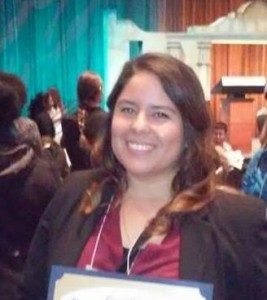There are many research support programs on campus that help underrepresented students in the sciences achieve their goals of pursing a Ph.D., including the MBRS – IMSD and MARC programs. The goals of these programs are to prepare students for direct entry into doctorate programs in the following fields: Science Technology Engineering and Mathematics (STEM), Psychology, Speech Language and Hearing Sciences (SLHS), and Public Health. One of the many exciting benefits that the MBRS – IMSD program offers is funding for travel, which allows scholars to present their research projects at national conferences. Students can choose two or three conferences to present at each year. Typically, scholars attend the Annual Biomedical Research Conference for Minority Students (ABRCMS) or Society for Advancment of Chicanos and Native Americans in Science (SACNAS) conferences; they also present at conferences specifically in their fields of interest.
This past year Amanda Brambila, a MBRS – IMSD Scholar majoring in Biochemistry, traveled to San Antonio, Texas to present her research at the 14th Annual ABRCMS Conference, held from November 12- 15, 2014. Amanda was recognized at the closing ceremony where she won an Outstanding Poster Presentation Award and was awarded $250.00 for her project entitled “Regulation of RyR2, NCX and SERCA in Neonatal Cardiomyocytes Using siRNA.” Amanda works in a lab with Dr. Paul Paolini – an eseteemed microbiology researcher at SDSU who leads the Cardiomyocyte Dynamics Laboratory (CDL).
In a MBRS-IMSD post-conference interview with Amanda, we were able to gain insight about her ABRCMS experience: “presenting my research at ABRCMS was fun, nerve-racking and interesting all at the same time. It was remarkable to talk to other scientists, other than the judges, that were interested in heart muscle and gene silencing techniques. Being able to discuss science with fellow colleagues was gratifying and rewarding, especially when feedback was provided to improve my project.”
Giving a presentation is never easy and can make you nervous. Bramila describes, “The most important tip I can provide is to practice, practice, practice. It is important to schedule practice time with mentors and fellow lab mates. As well to thoroughly understand your research, and be able to reference other projects that are ongoing in the lab.” One thing Amanda suggests to others interested in networking at conferences is to bring business cards and copies of your resume. It allowed her to network with other students, researchers, and professors throughout the conference.
She comments, “Attending this conference was educational and rewarding. It gave me the opportunity to communicate my research and network with other students and faculty. I definitely recommend students to take advantage of these events, as it prepares young researchers for future academic endeavors.”
Amanda will be graduating this May. She is currently interviewing for Ph.D. programs.
